Abstract
The brain undergoes massive and exquisitely controlled age-specific anatomical and physiological changes throughout development. The network paradigms discussed in this chapter provide a rich new method to track these dynamic interregional relationships and describe global properties of the developing system as a whole. Here, as background, we review the primary events of anatomical and physiological neurodevelopment from gestation through adolescence. We then describe early work elucidating the presence and evolution of agespecific functional brain networks in normal neurodevelopment. Finally, we discuss work aimed at understanding how these relationships may be altered in disease, and perhaps even rectified with treatment. Although much remains to be done, the application of the network model to the developing human brain holds tremendous promise for future discovery.
Keywords: Pruning, maturation, neuroanatomy, default network, epilepsy, autism.






















